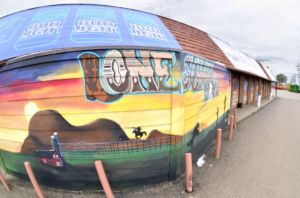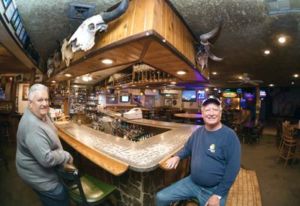ND Saloon Makes a Federal Case Out of City Ban on Murals
 The optics may be different than the case featuring a showdown between an inflatable Mario outside a Florida video store and local authorities determined to ban it.
The optics may be different than the case featuring a showdown between an inflatable Mario outside a Florida video store and local authorities determined to ban it.
But the same principles drive a similar legal standoff playing out next door in North Dakota, thanks to the Institute for Justice, a national nonprofit law firm that specializes in defending Americans’ constitutional rights.
The controversy focuses on a mural painted on the side of a Mandan saloon dubbed the “Lonesome Dove.” The owners thought a painting of a western landscape with cattle and cowboys amid a setting sun might round up more business–and it did.
Unfortunately the spiffy artwork also attracted the attention of city zoning officials who threatened the Lonesome Dove with hefty fines unless the mural went away by May 23.
Instead, it was local authorities who were ordered to back off last week by a federal court in another case involving overzealous government bureaucrats. U.S. District Court Judge Daniel Hovland ruled the city’s actions likely violated the owners’ free speech rights, according to an IJ news release.
The Court said that Mandan’s ban on commercial murals is “clearly not content neutral,” noting that the Supreme Court has struck down multiple restrictions that discriminated against commercial speech. “Commercial speech is valuable and serves an important public function,” the order continued. “Such a content-based restriction on speech as Mandan has enacted is unlikely to survive constitutional muster.”
Evidently the city of Mandan has been a serial offender of the First Amendment for a long time with numerous other examples leading up to the current controversy.
Over the years, Mandan has developed a litany of arbitrary regulations that allow the city to carefully control the content of murals. The city bans any mural with a “commercial message,” including any mural that contains the name of a business. Mandan also bans murals on the front of buildings, because—as the city admitted—it wants to hide murals that may be “political,” “controversial,” or “provoke thought.” Finally, the city requires all murals to apply for a permit, a process the city uses to play art critic, ordering changes to planned murals to suit the city’s liking. The city has enforced these regulations against multiple local businesses, with Lonesome Dove as the latest victim.
Mandan city officials haven’t exactly ridden off into the sunset yet, but their days of banning free speech in local businesses appear to be numbered. Their next day in federal court will be June 4.
“We are pleased that for now, our clients will be able to exercise their First Amendment rights and keep up their mural,” said Institute for Justice attorney Erica Smith. “Murals are a form of free speech and the First Amendment doesn’t let the government say what speech is OK and what isn’t.”
